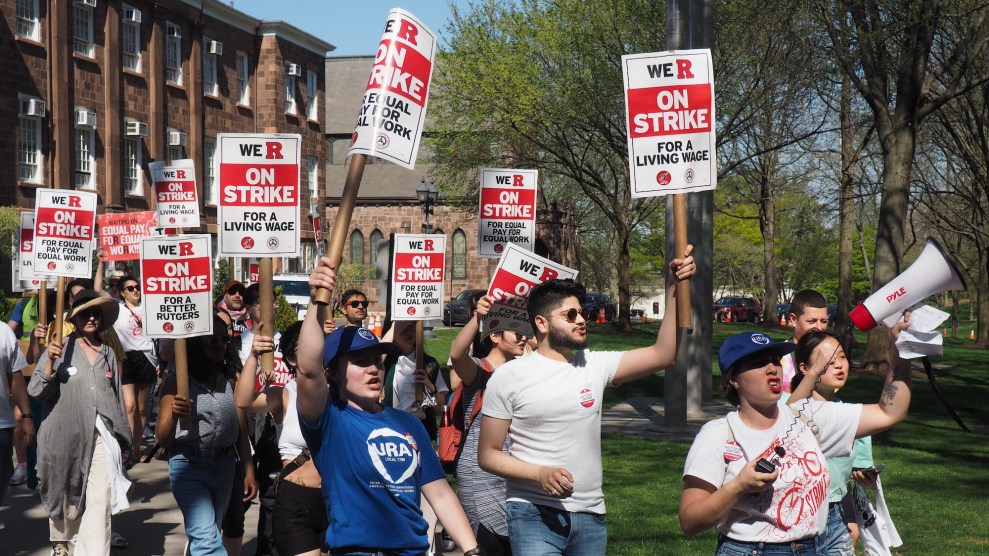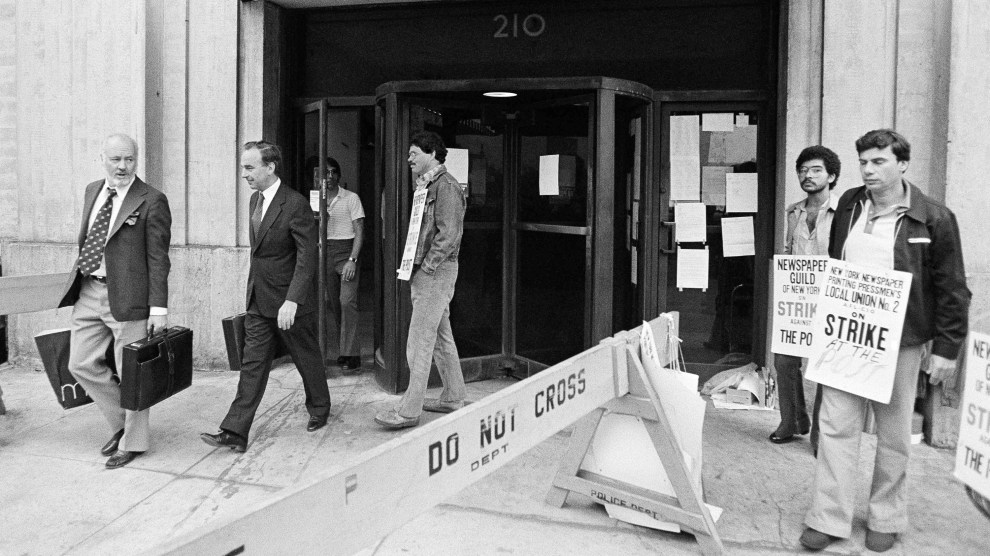
Noah Lanard/Mother Jones
On Thursday morning in New Brunswick, New Jersey, Martin Gliserman, a silver-haired English professor wearing his cap and gown, looked to be an elder statesman of the picket line. But despite having taught at Rutgers for more than 50 years, this was all new to him.
For the first time in Rutgers’ 257-year history, the faculty is on strike.
The story of why 9,000 faculty members represented by three unions decided to go on strike on Monday is a familiar one. “Buildings. A lot more buildings. Administrators. A lot more administrators. Poorly-paid faculty. A lot more of that,” Gliserman said about the changes that led to the strike. “That’s the direction in which it’s going.” The last time he saw the campus so energized was during Vietnam War protests in 1972, his second year on campus.
Faculty members are bargaining and striking together as they try to not only secure across-the-board pay increases but fix the systemic issues that impact their most vulnerable members. Like schools across the country, Rutgers now relies on poorly paid adjuncts and graduate students to teach many of its classes. The strike is showing what can happen when a relatively privileged group—tenured professors—unite with colleagues who lack the protections they enjoy.

Rutgers’ faculty members have gone more than nine months without a contract. A strike authorization vote passed last month with 94 percent support. Union leaders announced the strike after they failed to secure a new contract.
The Rutgers administration has said that it considers a strike by public sector workers to be illegal and that it could sue to try to force faculty back to work. Gov. Phil Murphy (D-N.J.) has stepped in to try to help unions and the administration come to an agreement. (The University of Michigan recently failed to convince a judge to force back to work graduate student workers who have been on strike since late March.) Union leaders have said they are “guardedly optimistic” following support from Murphy and his staff. Rutgers President Jonathan Holloway said in a statement on Thursday that “substantial progress” had been made and that the administration “will keep working until we have fair contracts for all of our employees.”
Amy Higer, the president of the Rutgers Adjunct Faculty Union, has been teaching at the university for more than twenty years. Like other adjuncts, she has no job security. She finds out what, if anything, she’ll be teaching the next semester a few weeks before class starts. Adjuncts now teach more than thirty percent of undergraduate courses. “It’s just a terrible system,” she explains. “It’s terrible for students. It’s terrible for education. So, we’re trying to address that and also the very low pay that we get.”
New adjuncts are paid about $5,800 per course, while those with more experience get about $7,000, she said. Seven courses over the course of two semesters is considered a full workload, meaning people with decades of experience can end up being paid less than $50,000 per academic year. They do not receive health insurance.
Adjuncts are fighting to be paid close to $10,000 per course, for health coverage, and for more job security. That would bring their pay and benefits more in line with the (also striking) non-tenure track faculty who receive contracts to teach full-time.
Rutgers graduate student workers, who currently make about $30,000, are pushing for $37,000 under the new contract. A first-year PhD student in the English department told me she pays $1,700 for a one-bedroom apartment near campus. She can’t afford a car on her current salary. For groceries, she takes a bus that runs once an hour.
More broadly, Rutgers faculty are pushing the university to recognize them as being part of one union. In practice, that is already happening as adjuncts and the professors have been bargaining together for the first time at Rutgers. Manu Chander, an English professor at Rutgers-Newark who serves as the head of the Newark chapter of Rutgers AAUP-AFT, calls it a “show of solidarity that recognizes that [adjuncts] exploited labor is essential to the operations of the university.”
Chander got involved with union leadership after a friend and former student had a stroke while teaching seven or eight courses across New Jersey in one semester. The friend, who has since recovered, had been sleeping in his car to get to an early morning class on the other side of the state. “I was just struck from that moment just how deep the divide between his situation and my situation was,” he said. “That difference couldn’t be chalked up to anything that carried any weight in my mind.”
On the picket line, I heard a similar sentiment from Ana Pairet, a professor in the French department since 1995. “I don’t want to be part of this,” she said. “I don’t want to enjoy securities that other people who perform similar teaching work don’t enjoy. It’s unacceptable to me. I’d rather resign. I’ve thought of it. If this were to continue, it would be an untenable position for me.”
“But,” she added, “we have a union so we have tools to counter this.”













